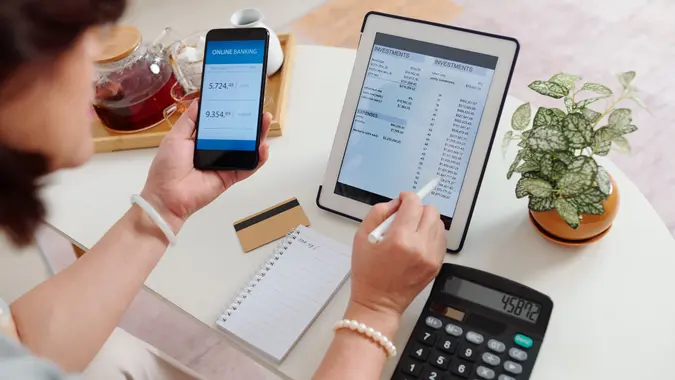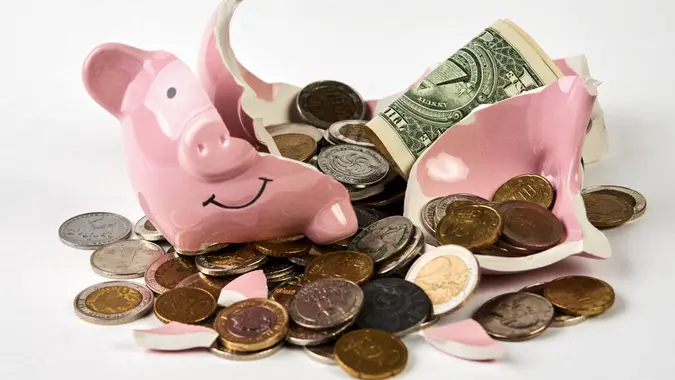Here’s How Inflation Impacts Your Bank Account (And How To Take Advantage)

Commitment to Our Readers
GOBankingRates' editorial team is committed to bringing you unbiased reviews and information. We use data-driven methodologies to evaluate financial products and services - our reviews and ratings are not influenced by advertisers. You can read more about our editorial guidelines and our products and services review methodology.

20 Years
Helping You Live Richer

Reviewed
by Experts

Trusted by
Millions of Readers
Inflation isn’t just a buzzword — it has real effects on your finances, from the interest rates on loans to the value of your savings.
While rising prices can feel like a financial setback, they also create opportunities to make smarter money moves.
Whether it’s adjusting where you store your cash, locking in favorable loan terms or investing in inflation-resistant assets, understanding how inflation impacts your bank account can help you stay ahead. Here’s how to navigate inflation’s challenges — and take advantage of its silver linings.
Interest Rates May Go Up
When inflation rises, banks and other financial institutions also tend to raise interest rates, making it more difficult for borrowers to take out loans, whether those be personal or business loans, according to Jim Pendergast, general manager of altLINE by The Southern Bank.
However, he said it is important to note that inflation isn’t the only factor determining rates. “Overall supply and demand, each individual financial institution’s liquidity, and customer risk can play a role as well.”
But Your Bottom Line May Go Down
Higher interest rates and inflation can shrink your wealth if you’re keeping it in a regular savings account, Pendergast said.
“If inflation is higher than what your savings account earns, which can be common in an economy like this, your returns would be net-negative.”
While in theory, wages should also go up when inflation does, that doesn’t always occur.
Conventional Savings Accounts Won’t Cut It
If you are stashing cash in a conventional bank account, such as a checking or savings, the chances are that you’re earning a negative return on that cash due to the rate of inflation “exceeding the miniscule interest rate that your bank account pays you,” according to Vince DeCrow, founder of RISE Investments.
Inflation, as measured by the consumer price index (CPI), is currently running at 3.0% on a year-over-year basis. So, if you’re earning a 0.05% interest rate on the cash you have in your savings account, the purchasing power of your cash is actually shrinking by the day, DeCrow pointed out.
“That is because the cost of goods, measured by CPI, are currently rising at a rate of 3% a year while your money is only growing at 0.05% a year.”
Consider Alternatives
DeCrow said that some good alternatives to reverse this inflationary trend and grow your purchasing power without putting your money at significant risk are:
- A high yield savings account currently paying around 3.5% to 4.0%
- A money market fund currently paying around 4.2%
- A Treasury inflation-protected securities (TIPS) fund where the value of a TIPS fund goes up when CPI rises, resulting in increased coupon payments to the investor
How To Take Advantage of Inflation’s Silver Lining
While inflation can be problematic, it can also be beneficial, according to Sara Levy-Lambert, head of growth at RedAwning. Consumers can lock in long-term, fixed-rate loans before rates go up further and invest in sectors that do well with prices rising.
“Locking in a low fixed-rate mortgage, on the other hand, can protect you from future cost escalations, and some sectors of equity may benefit from nominal gains,” she said.
Rethink Your Budget in an Inflationary Economy
In addition, retooling your budget is essential during inflation to make sure your spending is in step with shifting economic conditions, Levy-Lambert said.
This can look like rebalancing your financial priorities by shifting income toward yield-type investments of higher return or cutting back on discretionary expenses. Steps like this can insulate your purchasing power rewards from the ravages of inflation, she said.
 Written by
Written by  Edited by
Edited by 

























